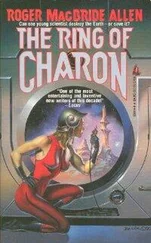But Lucian heard nothing. He stepped right through Larry’s image as he turned to look at the Charonians behind the TeleOperator. “Behind you!” Lucian called out.
Larry turned around and followed—or at least used the joystick to move his image, to try once again to make Lucian see the image of him, make him see Larry in street clothes, Larry dressed normally, a bit of everyday life. But no. It was useless. Worse than useless. Lucian didn’t see Larry at all. Just the TeleOperator Larry had controlled that day, the image of the robotic body playing its part in the drama that was playing itself out over and over. Lucian could see the ghost of the machine Larry had been working that day, but not Larry himself.
If anything, Lucian was less aware of Larry with each repetition, not more. Lucian was getting canalized, caught more and more deeply in those last few minutes of life as he was forced to relive them over and over. The events were burned into Lucian’s mind, and his mind absolutely refused to see anything else. And seeing them over and over again was not much of a pleasure for Larry, either.
Larry Chao let go of the joystick and pulled the view-helmet off. He peeled the electrodes off the sides of his head. His face was drenched in sweat. Dear God, what Lucian had been through. And now to be locked inside his last moments, to relive the terror of his own capture over and over and over again.
Somehow, some subunit of the dead Lunar Wheel had kept feeding the same input to Lucian, over and over again, for the last five years. The images of Lucian’s own last minutes. Maybe the Charonians thought they could make sense of it all by running it over and over again. Maybe that fragment of the Wheel had been dealing with that incident at the moment the Wheel had died and just gotten locked into it.
The medical-studies team said the Charonians had run two sets of neuro taps into Lucian—one that ran visual and aural input into his nervous system, and another that monitored what his brain actually saw and heard. It was not mind reading, not telepathy, but it was damned close. The Charonians could make whatever they wanted go into Lucian’s eyes and ears—and then monitor what his brain actually saw, what Lucian made of it all.
No human surgeon could hope to place those kinds of sensory input and output links, but human techs could tap into the links. They had done so—and added a computer-generated image of the present-day Larry Chao to the inputs.
“I can’t do it,” Larry said at last, not looking up, not looking at anyone or anything. “I can’t do it.”
Larry stepped down from his chair and turned to face the two women at the control panel. “I can’t do it,” he said again, shaking his head, sitting down on the rest chair. His legs didn’t seem too steady. He forced himself to settle down, take it easy.
It had all seemed so logical, somehow. Inject a sim, a computer-generated image of Larry Chao’s body, into Lucian’s sight and sound links. Hook up the sim to a mike so it would mouth Chao’s speech in real time, and mimic his facial expressions, at least a little bit.
Meanwhile, tap into the outputs of Lucian’s sight and sound links to interpret what Lucian was seeing and hearing in his dream, moment by moment, then merge that imagery with other data sources to back-angle the scene and feed images to Larry’s viewhelmet, so that Larry in the VR control unit would see Lucian from where the Larry Chao sim was standing.
In short, the computer trickery was supposed to inject Larry’s image into the scene Lucian was seeing, and let Lucian see Larry standing in the middle of Lucian’s dream. Let Larry wander around inside a dead man’s dreams.
Except it wasn’t working.
Larry thought of Lucian, lying in the chamber a bit down the Wheelway, still entombed, with human probes and wires and inductive optic-nerve readers and cables snaking around the Charonian tendril net that led from his body.
Damnation. Why the hell was Lucian stuck in those last momtents? Why couldn’t they break him out?
Marcia MacDougal stepped from behind the control panel, snagged another chair, and sat down in front of him. “You’re tired,” she said. “We’ll try it again in the morning. You need to rest.”
Selby Bogsworth-Stapleton brought him a glass of water and squatted down in front of him. She handed him the water and gave him an encouraging pat on the knee. “Have a rest,” she said. “We can have another go at it later.”
“No,” he said. “Neither of you understand. I can try again, right now, if you want. That’s not what I mean. What I’m saying is I can’t do it. You’re projecting my image into his dream, or nightmare, or whatever, but he’s not seeing me . He’s not aware of me. He is not consciously refusing to react. He can’t see me at all. The visual inputs are getting fed to his brain, but his brain isn’t accepting. All he’s seeing is his own memory. He just keeps looping through the last few minutes of his life, over and over again.”
“No change at all?” Selby asked.
“Oh, yeah, it changes,” Larry growled. “It gets more vivid every time. You saw the repeater screens on the console. That last run was solid, sharp as a tack. First time we barely got anything at all but static. The run time’s getting faster too, I think. Hard to tell from inside the VR and the view-helmet, but it seems like it.”
“It is,” Selby said. “By about a factor of ten since the first time.”
“That’s the computer getting better at its job,” Marcia said. “We’ve fed it more angles of the playback from the real event, the real first trip down the Rabbit Hole. It’s processing faster, doing better data-smoothing and integration of—”
“That’s some of it, yes,” Larry said, cutting her off. “But there’s more. We’re feeding Lucian direct stimulus, and it’s—well, it’s stimulating him. There’s more power behind his thoughts. He’s seeing more clearly each time, feeling it all more powerfully, running through it faster.”
“We are getting an uptick in his brain-wave amplitude,” Marcia admitted, “and it is speeding up. But he has to be able to see you. We’re pumping your image straight to his optic center.”
“ You’ve never owned a cat. I can see that,” Selby said.
Larry and Marcia both looked at her in confusion.
“Cats!” Selby said. “They refuse to see what they don’t believe in. Put some strange object that they don’t want to deal with in front of them and they’ll act as if it’s not there. To them, it isn’t there.”
“So what you’re saying is that Lucian doesn’t see Larry because he doesn’t believe in Larry,” Marcia said.
“I suppose that’s one way to say it,” Selby said. “The thing of it is that we can manipulate what goes into his optic nerve and into his auditory receptors, but that’s not the same as changing what he thinks . It’s what he thinks he’s hearing and seeing that matters.”
“And what I’m saying is that we have to look at the, ah, other way of doing this,” Larry said, forcing himself to be firm, determined. He did not want to do this. “It’s not enough for me to be there, shouting to get his attention. We have to break him out of the rote pattern of his memory. We can’t just tell him what he is seeing isn’t happening. We have to change what he’s seeing.”
Selby and Marcia exchanged glances at each other, and Selby cleared her throat, a bit awkwardly. “We were both rather hoping that it wouldn’t come to that,” she said. “We were a bit worried that might not be the most pleasant sort of thing for you to do. It would be rather—stressful.”
Читать дальше









![Ширли Мерфи - The Shattered Stone [calibre]](/books/436059/shirli-merfi-the-shattered-stone-calibre-thumb.webp)


